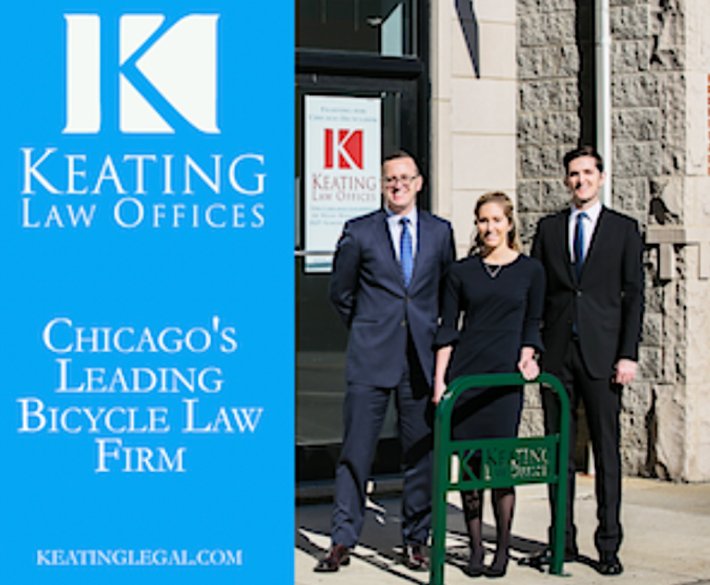
Today, the 46th Ward's Ald. Angela Clay joined the Chicago Department of Transportation and Lyft, the Divvy concessionaire, to snip the strip in front of a new charging station at Waveland Avenue and Broadway in Lakeview. The electrified bike share docks are part of a citywide program to improve over 100 stations with the ability to refuel electric cycles and scooters. CDOT says the benefits will include higher availability of well-charged vehicles, and less need for workers to burn gasoline while replacing bike batteries.
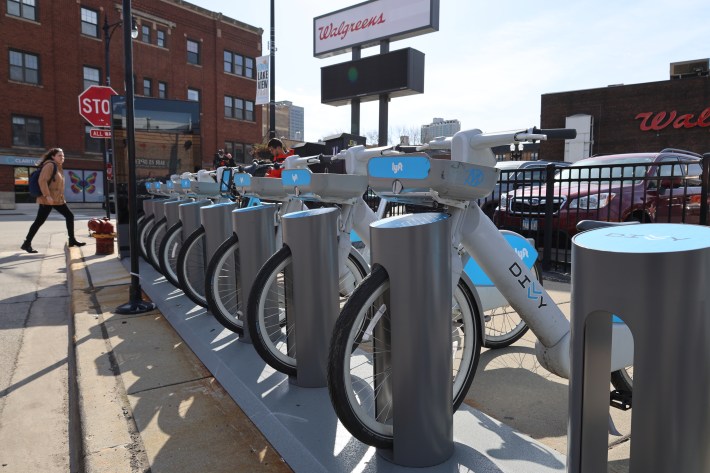
I'll discuss more details about the charging stations at the end of this article. But at the ribbon-cutting, I had a chance to ask Ald. Clay about a few other important recent sustainable transportation and traffic safety issues that may be of interest to many Streetsblog readers, so I'll share that interview first.
Ald. Clay talks transportation policy
Elected almost exactly two years ago, Ald. Clay is a member of the City Council's Progressive Reform Caucus and Democratic Socialists of America Caucus. Her ward includes parts of Lakeview, and most of Uptown. The transcript has been edited for clarity and brevity.
John Greenfield: So what do you think about the new Divvy charging stations?
Ald. Angela Clay: I think it's beautiful. I think it's an improvement that a lot of Chicagoans will really appreciate, especially those who are frequent bike riders like myself and able to pick up a fully charged e-bike that will take you across this beautiful city, or connect you to other forms of public transportation.
JG: All right, great. Another thing I wanted to talk to you about is the proposal for protected bike lanes on Clark Street between Winnemac and Montrose avenues [including the conversion of car parking spaces], with a lot of it in your ward. I attended a Beacon Block Club meeting on that, which was pretty positive. One of your staffers, [Director of Infrastructure and Development] Jesse Orr was presenting. What are your thoughts on that idea?
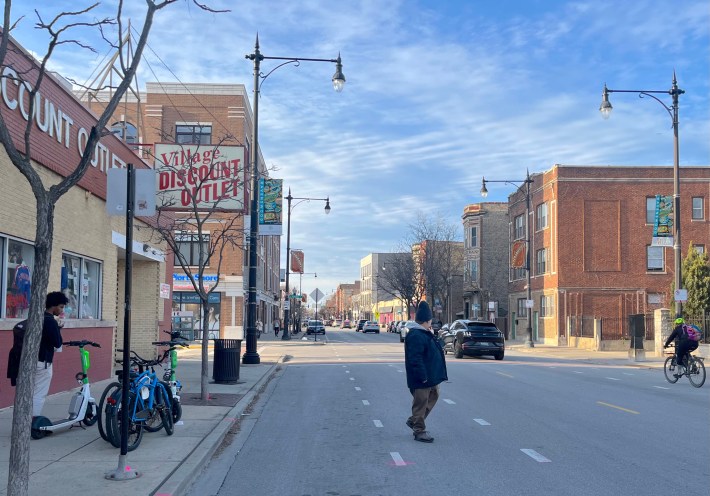
AC: Jesse's awesome. We're really excited to just make sure that we are focusing on community feedback, getting as much input as possible. Because one side of the street could differ from the other side of the street [in terms of parking conversions.] So what my team has been really dedicated to doing is making sure that we do in-person visits with all of the business owners, making sure that we are talking to all of the surrounding neighbors. And also just making sure that we have a plan for some of the things that people bring to us.
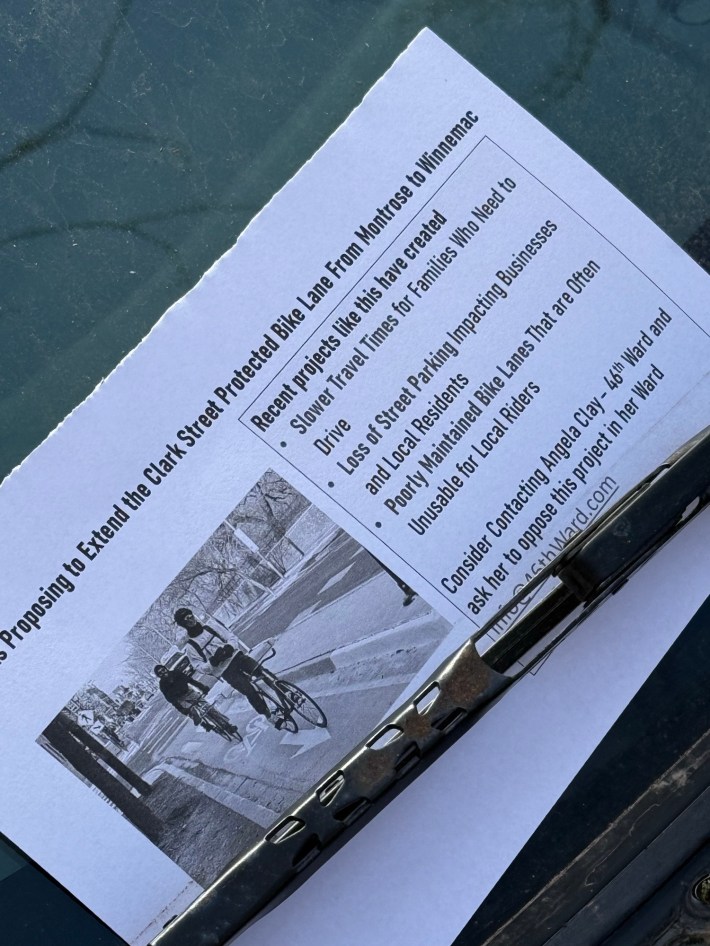
There has been really good feedback around, like, "What if I have a class that I need to teach early in the morning – where are my folks gonna go?" So just getting creative about how we use and share space. Some businesses are closed on the weekends, and some have a little bit more space for folks to park if you still want to drive. But others, I think they understand the vision, and they also understand the protections that it can bring to our neighborhood.

Want to help ensure Streetsblog Chicago can keep publishing articles like this for another year? Please consider making a tax-deductible gift here. Thanks!
JG: OK, great. One more thing I wanted to ask you about... The 25 mph speed limit, you voted for that. [In February, the ordinance proposing lowering Chicago's defeaut speed limit from 30 mph was defeated by 28 to 21 votes.] Have you heard anything about what's going on with that now? I talked to [Ald. Andre Vasquez (40th)] recently, and he told me a little about trying to relaunch that campaign. Do you have any thoughts on that?
AC: I don't have any updates. I think that it's something that we could continue to look at, what are the real implications. And different wards, they differ, right? And I know everybody, no matter where you live in the city, does not want somebody to have an extra ticket on their car. But we also want to make sure that we are protecting people in an efficient manner. So I'm looking forward to the continuing conversation, especially in our neck of the woods, where we're trying to make sure that we are safe, mobile, accessible. And we have had some fatalities on our side streets, with folks just "doing the dash," as they say.
[One tragic example of this in the 46th Ward was in April 2022, when a driver fatally struck Yehuala Melkama, 44, at the intersection of Sunnyside Avenue and Hazel Street in Uptown.]
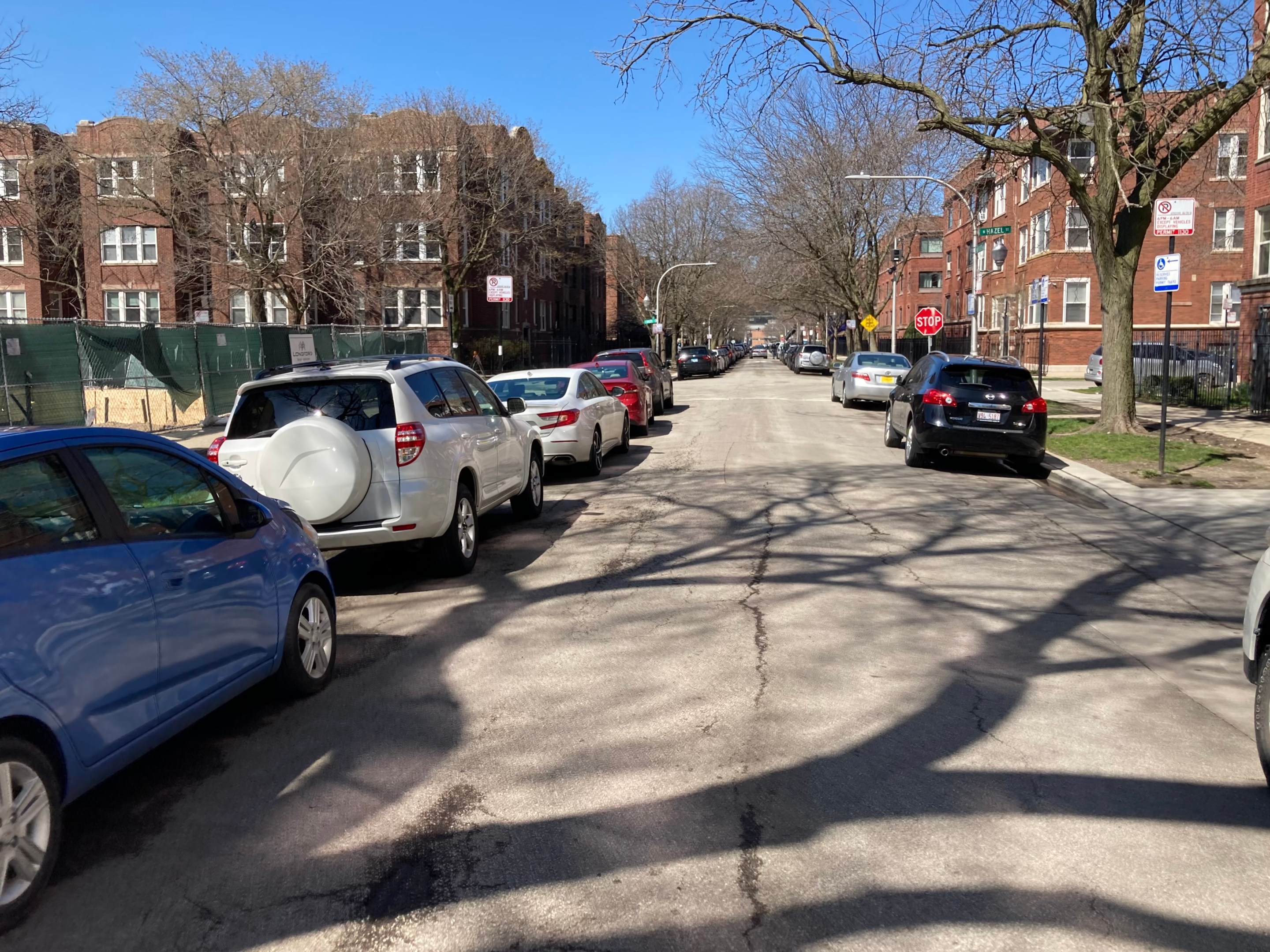
JG: One more thing I wanted to ask about that topic was that I proposed to Ald. Vasquez bringing back the Clear Path pilot program's 50 percent discount on tickets for low-income residents.
AC: Please! That's an amazing pilot program. Think about it: If folks are on a fixed income, if you're a senior or a family, the last thing you need is to be worried about your main source of transportation that gets you to and from work, school, play being taken away from you. So I do think that that's an amazing opportunity that we can bring back that a lot of our neighbors would benefit from tremendously.
JG: Another idea is, currently [in Chicago] there's a default speed limit of 30 mph, and you can go 35 without getting ticketed [by a traffic camera]. If you speed by 6 mph, 36 mph, you get a ticket.
Now, compare that to New York City, where the speed limit is 25, but they have a 10 mph threshold. So you can also do 35 and not get ticketed. But the speed is posted at 25, so probably more law-abiding people won't go much faster than 25.
What would you think about that deal, that if we lowered the speed limit to 25, then we go back to having a 10 mph threshold, and you get ticketed if you go 11 mph over that.
AC: I think that's part of the conversation. I think that's one of the ideas that a lot of folks wanted to bring to the potential ordinance change. It just wasn't captured at the time people wanted to pass it through. So I don't think that it's far-fetched. I don't even think that it's even something that should be taken off the table. What we're trying to do is look at other large cities that are trying to make sure that their population is not negatively impacted by, one, having a really high rate of speed, and also trying to make sure that we're not ticketing you.
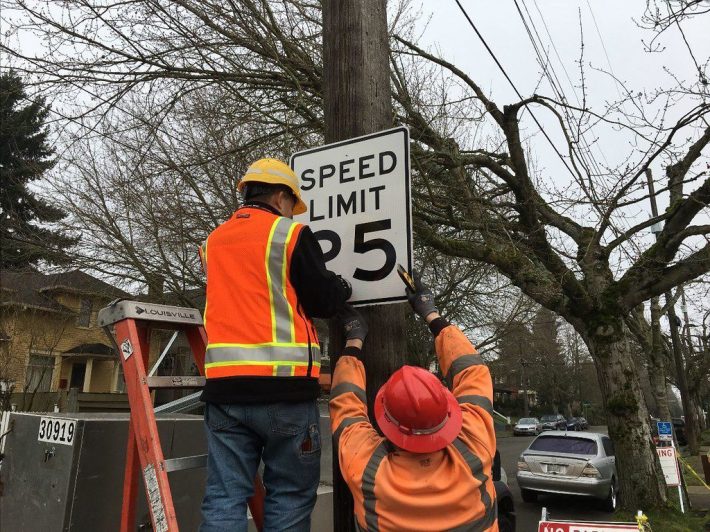
A lot of what my colleagues who voted against this were bringing up were still valid issues. Their communities are being over-taxed and over-ticketed. And so, trying to make sure we're meeting this at an equitable space is something that I'm committed to.
More about the Divvy charging stations
According to CDOT, making just a fraction of Chicago's docking facilities charging stations will eliminate roughly 100,000 vehicle miles traveled, while increasing e-vehicle availability by no less than 15 percent.
"Divvy is a key part of Chicago's transportation system, and these upgraded charging stations are a step forward in making Divvy more efficient, more sustainable, and more reliable," said CDOT Commissioner Tom Carney at today's event. "Divvy continues to grow in popularity year after year, and we're committed to building on that momentum by improving the system and expanding access for riders in every part of the city."
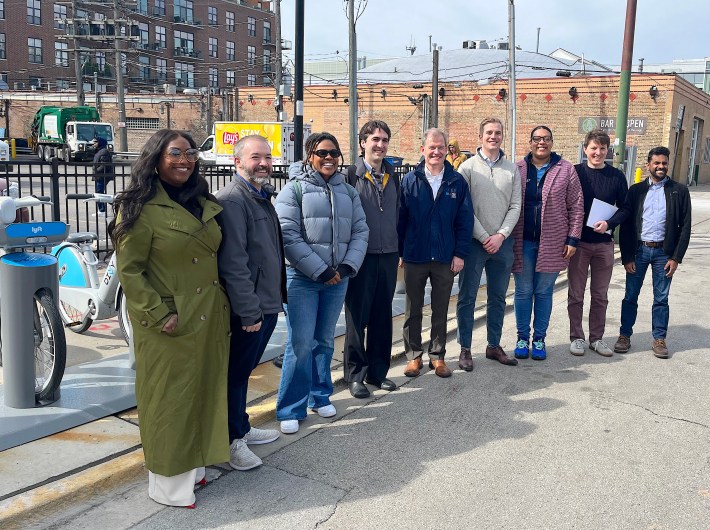
Other new Divvy charging stations in the 46th Ward are located at Cornelia Avenue and Broadway, and Irving Park Road and Pine Grove Avenue. There are 28 charging stations in Chicago so far:
- Wentworth Ave. and Cermak Rd.
- Fort Dearborn Dr. and 31st St.
- Wilton Ave. and Diversey Pkwy.
- Lincoln Ave. Roscoe St.
- Bissell St. and Armitage Ave.
- Green St. and Randolph St.
- Morgan St. and Lake St.
- Milwaukee Ave. and Wabansia Ave.
- Southport Ave. and Waveland Ave.
- Loomis St. and Lexington St.
- Sheffield Ave. and Kingsbury St.
- Sheffield Ave. and Fullerton Ave.
- Halsted St. and Dickens Ave.
- Southport Ave and Wrightwood Ave
- Burling St. and Diversey Pkwy.
- Wood St. and Milwaukee Ave.
- Franklin St. and Chicago Ave.
- Sedgwick St. and North Ave.
- Halsted St. and Roscoe St.
- Damen Ave. and Chicago Ave.
- Broadway and Waveland Ave.
- Damen Ave. and Pierce Ave.
- Pine Grove Ave. and Irving Park Rd.
- Racine Ave. and Belmont Ave.
- Clark St. and Newport St.
- Wells St. and Huron St.
- Broadway and Cornelia Ave.
- Clark St. and Grace St.
Update 4/4/25, 4:30 PM: CDOT spokesperson Erica Schroeder provided more information about the charging station locations. "All the listed locations are now live," she wrote. "Installing charging stations in close proximity creates a more efficient and self-sustaining charging network. The densest clusters of high-ridership stations are found in the North Side and downtown. This approach maximizes the benefits of reducing manual battery swaps and cutting down on the vehicle miles traveled to service the system. The network will continue to expand throughout the city using this clustered approach. Charging stations function just like classic stations for users who shouldn't notice any difference. The benefit of electrified stations is in the battery swaps, rebalancing, reduced VMT, and availability of e-devices."

Did you appreciate this post? Streetsblog Chicago is currently fundraising to help cover our 2025-26 budget. If you appreciate our reporting and advocacy on local sustainable transportation issues, please consider making a tax-deductible donation here. Thank you!




